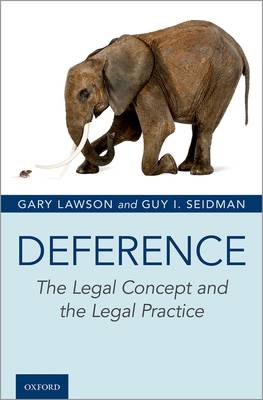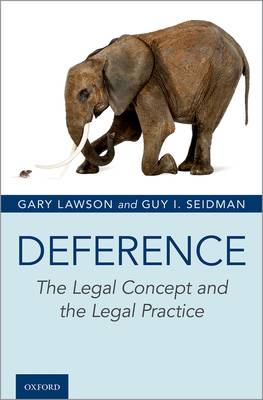
Door een staking bij bpost kan je online bestelling op dit moment iets langer onderweg zijn dan voorzien. Dringend iets nodig? Onze winkels ontvangen jou met open armen!
- Afhalen na 1 uur in een winkel met voorraad
- Gratis thuislevering in België vanaf € 30
- Ruim aanbod met 7 miljoen producten
Door een staking bij bpost kan je online bestelling op dit moment iets langer onderweg zijn dan voorzien. Dringend iets nodig? Onze winkels ontvangen jou met open armen!
- Afhalen na 1 uur in een winkel met voorraad
- Gratis thuislevering in België vanaf € 30
- Ruim aanbod met 7 miljoen producten
Zoeken
€ 201,45
+ 402 punten
Omschrijving
Deference is perhaps the most important concept and practice in law. It lies at the core of every system of precedent, appellate review, federalism, and separation of powers, all of which center on how one actor should deal with previous decisions. Oddly enough, deference is also one of the most under-analyzed and under-theorized legal concepts and practices, perhaps because its applications are so varied. This book's goal is to provide a definition of deference and a vocabulary for discussing it that can be used to describe, explain, and/or criticize deference in all of its manifestations, including some manifestations that are not always identified by legal actors as instances of deference. This project does not seek to prescribe whether and how any legal system should apply deference in any specific circumstance or to critique any particular deference doctrines. Rather, it aims to bring the concept of deference to the forefront of legal discussion; to identify, catalogue, and analyze at least the chief among its many applications; to set forth the many and varied rationales that can be and have been offered in support of deference in different legal contexts; and thereby to provide a vocabulary and conceptual framework that can be employed in future projects, whether those projects are descriptive or prescriptive.
Specificaties
Betrokkenen
- Auteur(s):
- Uitgeverij:
Inhoud
- Aantal bladzijden:
- 228
- Taal:
- Engels
Eigenschappen
- Productcode (EAN):
- 9780190273408
- Verschijningsdatum:
- 9/12/2019
- Uitvoering:
- Hardcover
- Formaat:
- Genaaid
- Afmetingen:
- 155 mm x 239 mm
- Gewicht:
- 453 g

Alleen bij Standaard Boekhandel
+ 402 punten op je klantenkaart van Standaard Boekhandel
Beoordelingen
We publiceren alleen reviews die voldoen aan de voorwaarden voor reviews. Bekijk onze voorwaarden voor reviews.











